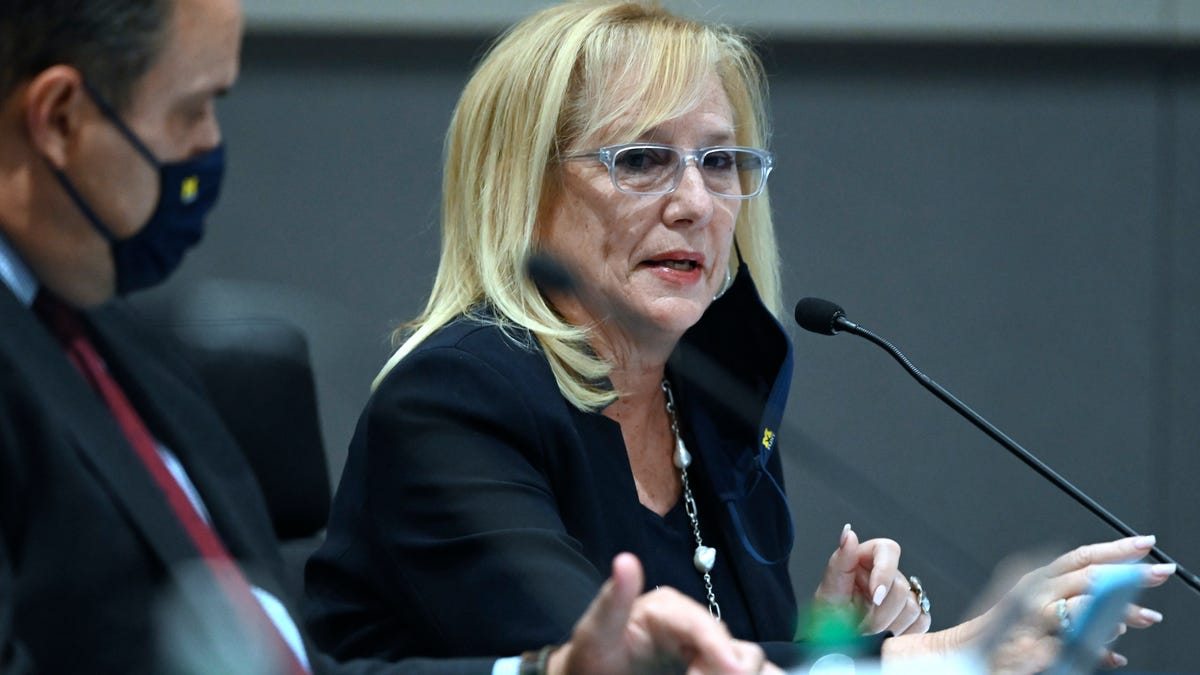The University of Michigan Board of Regents is now publicly calling for the addition of a Division I women’s hockey program.
“It’s time for the University of Michigan to have a varsity team for its women’s hockey program,” Regent Denise Ilitch said at Thursday’s meeting.
Ilitch added: “Right now, the people of Michigan aren’t being served,” and pointed to Michigan natives Kirsten Simms and Cassie Hall as examples of a “broken cycle” of elite talent having to leave the state to play college hockey.
Simms is a Plymouth native, who was a finalist for the Patty Kazmaier Memorial Award as the nation’s top female hockey player. Hall is from South Lyon and also plays for the University of Wisconsin, which lost, 1-0, in the NCAA final to Ohio State on Saturday in Durham, New Hampshire.
Michigan president Santa Ono said he’s now recommending a feasibility study to athletic director Warde Manuel. Manuel wasn’t present at the meeting, but Ono said he’d report back to the Regents after making the suggestion.
Ilitch’s public call is the most vocal and powerful voice in the movement to add varsity hockey at Michigan.
In March, the Professional Women’s Hockey League brought a neutral-site game to Little Caesars Arena between Ottawa and Boston that set a league record for American attendance of 13,736.
For the PWHL, it was a test run of a potential expansion market, while multiple PWHL players called for more collegiate hockey options in the state, which has the fourth-largest population of girls hockey players after Minnesota, New York, and Massachusetts, according to USA Hockey.
“I believe as a public official, who’s trying to do what’s best for the people of Michigan, I think there’s a clear need here and a clear want here,” Regent Jordan Acker told The Detroit News. “Michigan is a hockey state. We produce some of the best female players in the world, and they have to go somewhere else because we aren’t providing the opportunities.”
Acker said there are key issues he needs to see examined, which a sustainability study would likely cover.
“We have to understand what it’s going to cost, not just the cost of a program, but also the cost of facilities,” Acker said. “And that’s been a big question mark. … Yost (Ice Arena) is not what you would call a built-out modern facility, and there isn’t really space to build out. So, you’d think there needs to be a general recognition that we need another sheet of ice for this to work.”
Acker said as a Regent, he can push and support this, but, ultimately, it’s up to the president and athletic director to move forward in the potential process.
“Those things take a significant amount of time,” Acker said. “And in a time of instability in college athletics, it’s important to do that and take that time, you need to know the realities. But it’s also very important in my mind that we are doing our best to look into what it would take to bring Division I hockey into Michigan.”
Mike Snee is the executive director for College Hockey Inc., a non-profit that conducts feasibility studies for programs looking to add college hockey, with funding from the NHL and NHLPA industry growth fund. Snee spoke with The Detroit News on Thursday to explain what a feasibility study might include.
“There would be a study to essentially see what the cost will be for Michigan to have a competitive women’s hockey team,” Snee said. “This isn’t a study that would say, ‘Yes’ or ‘No’ for a school, but it would be a resource.”
Snee said these studies typically explore costs associated with facilities, travel, recruiting, and potential conference fits. With Michigan, Snee said the biggest question would likely be related to facilities and space for another varsity team.
Snee also said it was important to note that Michigan hadn’t yet officially ordered a study, but he said that the development on Thursday was better for hockey across the state.
“It’s not just a big day for women’s hockey or Michigan hockey,” Snee said. “This is a big day in general for hockey. That’s what the NHL and NHLPA growth fund looks for in these things, how can you grow the game. And now there is a potential chance for hockey to grow even more in Michigan because of this.”
Snee said he couldn’t give expected numbers or costs for a potential Michigan women’s varsity team, not without having a study at first.
Michigan currently has a women’s club hockey team. The student-athletes cover most of their expenses, with some help from the University when it comes to paying for ice time and rental of Yost.
Michigan club coach Jenna Trubiano also said on Thursday that part of the charter for the club is to lay the base for a future Division I varsity program.
Trubiano told The Detroit News that Thursday was a monumental day for her program.
“For us to see this, it’s a huge step in Michigan adding women’s varsity hockey, this is something everyone who’s played for this program both now and in the past has worked for,” Trubiano said. “This is a big day for our alumni, current players, and hockey in general in Michigan.”
Sean Shapiro is a freelance writer.

